This article was co-authored by Carlotta Butler, RN, MPH. Carlotta Butler is a Registered Nurse in Arizona. Carlotta is a member of the American Medical Writers Association. She received her Masters of Public Health from the Northern Illinois University in 2004 and her Masters in Nursing from the University of St. Francis in 2017.
There are 9 references cited in this article, which can be found at the bottom of the page.
This article has been viewed 17,268 times.
Concerts are fun to attend and give you a chance to see some of your favorite bands up close. However, standing in front of a loud band or blaring speakers—regardless of the musical genre—can cause permanent damage to your hearing. This effect will only become worse if you attend concerts frequently. In order to protect yourself from permanent hearing damage, plan to wear earplugs to every concert you attend, and stand relatively far from speakers and amps. You should also not expose yourself to loud volumes or high decibel levels after concerts, and visit your doctor if you’re concerned about suffering hearing loss.
Steps
Being Safe at a Concert
-
1Wear foam or silicone earplugs. Foam and silicone earplugs are the most common means of hearing protection at concerts, and an effective method to block harmful levels of sound from your ears. Foam or silicone earplugs can protect you from serious hearing damage, and serve to block out harmful levels of sound.[1]
- You can compress foam earplugs before you put them into your ears, and then they will expand to fill your ear canal. You can shape silicone earplugs to conform to the shape of your ears.
- If you’re at a concert without earplugs, never improvise by stuffing tissues or wadded cotton balls into your ears.[2] Not only will these materials fail at blocking sound, but they may cause physical damage to your ears if you shove the tissue or cotton in too deeply.
- You can purchase earplugs at a grocery store, drugstore, or in larger stores, like Walmart or Target.
-
2Consider purchasing custom earplugs. If you attend concerts frequently or would like earplugs that offer more protection than everyday foam earplugs, consider being measured for a pair of custom earplugs. These are designed to fit the dimensions of your ears and are made of a higher-quality material that blocks a higher number of decibels.[3]
- Another benefit of custom earplugs is that they will not simply mute all levels of sound (like foam earplugs will), but they’ll effectively filter the music so that you can still hear well and not feel like you’re listening to the concert from underwater.[4]
- There are multiple businesses that create and sell custom earplugs. You can start looking for one of these companies with an online search: check out companies such as Radians, Ear Peace, and Decibulls.
Advertisement -
3Stand away from the speakers. Regardless of the type of earplugs you’re wearing, you’ll be at a greater risk of hearing loss if you stand right in front of the speakers and amplifiers, or right in front of the loud band. As a general rule, the back of the room will be quieter than the front. If you’re able to choose your own location at the concert, opt for a setting as far as possible from speakers and amps.[5]
- Always sit at least 10 feet (3 meters) away from any speakers.
- If you’re at a concert with assigned seating, consider purchasing seats farther away from the stage. As an additional benefit, these seats will likely be less expensive.
Keeping Your Hearing Intact
-
1Moderate the number of concerts that you attend. Even if you wear earplugs at every concert, you only increase the risk of hearing damage with every concert that you attend.[6] Try to limit the number of concerts that you attend, and consider decreasing the number if you attend concerts frequently. If you attend over 12 shows a year, try cutting the number back to 5 or 6.
- Drinking alcohol at concerts presents a further risk to your ears. Intoxicated individuals may not feel the painful effects of hearing damage, or may dull your sensitivity to the ringing in your ears.
- For this reason, avoid intoxication at concerts. If you want to drink, do so moderately, and be sensitive to pain and ringing in your ears.
-
2Give your ears time to recover after a concert. If you’ve attended a loud concert, your ears have doubtless been exposed to loud sounds for an extended period of time. Even if you wore foam or custom earplugs at the concert, it will help your ears recover to give them a “hearing detox.” This is a period of time during which you avoid all loud noises to give your ears time to recover from the concert. Give your ears about 16 hours without any exposure to loud sounds after every concert.[7]
- When on a “hearing detox,” avoid listening to loud music—whether at live shows or through your headphones—and avoid loud construction zones, heavy traffic, and seeing movies in the theater. It may seem surprising that movies can damage your hearing, but many action films reach peak volume above 100 dB.
-
3Protect your ears if you work at a concert venue. If you’re employed by an amphitheater, sports arena, jazz or rock club, or other type of concert venue, you will frequently be exposed to potentially harmful levels of sound. Plan to purchase yourself a high-quality pair of custom earplugs as soon as possible; considering using a pair of earplugs similar to those that professional musicians use. Check out—online or in-person—the HealthDoc HiFi earplugs or LiveMusic HiFi earplugs.
- You may also decide to purchase a pair of over-the-ear hearing protectors to wear even when your earplugs are in. Avoid using foam earplugs, as these will provide inadequate protection to someone who works in a music venue.[8]
-
4Be aware of the signs of hearing loss. If you’ve ever been to a loud concert and afterwards (when in the quiet of your car driving home or in your bedroom that night) still heard a ringing sound in your ears, you’ve experienced hearing damage. This phenomena is called “tinnitus.” After the first several times you experience tinnitus, the ringing sound goes away after a while. However, tinnitus can develop into a permanent condition, which can diminish your hearing permanently.[9]
- Having a full feeling in your ears may also be a sign of hearing loss. This may feel similar to the pressure feeling you get when you are flying on an airplane.
- Ear discomfort after exposure to loud sounds, such as a concert can be another sign of hearing loss. This discomfort or painful sensation can include an aching deep inside your ears.
-
5Take hearing protection seriously. Your ears are sensitive, delicate instruments that can be damaged when exposed to sound volumes higher than 85 decibels (dB) for long periods of time. The volume at most concerts registers between 100 and 140 dB, meaning that your hearing is at risk at nearly every show you attend.[10]
- If you don’t take measures to protect your hearing, you risk causing permanent damage to your eardrums or to the fine hairs in your inner ear.
-
6Talk to your doctor if you’re concerned about hearing loss. Hearing loss is a serious issue, and its effects are irreversible. If you attend concerts frequently or are worried about your own hearing, talk to your doctor. Also tell your doctor if you notice hearing-related symptoms, including some sounds sounding louder or quieter than they usually do, you have to keep turning the TV and radio up, or if people’s voices sound slurred or indistinct.[11]
- Your general-care doctor may refer you to an audiologist (ear specialist) if the doctor fears that you’ve already suffered from hearing damage. If you’re referred, set up this appointment immediately.
References
- ↑ http://www.metalinjection.net/around-the-interwebs/reminder-if-you-dont-wear-ear-plugs-to-shows-you-will-suffer-tinnitus
- ↑ https://www.theguardian.com/lifeandstyle/2012/may/13/should-wear-earplugs-to-concerts
- ↑ http://www.metalinjection.net/around-the-interwebs/reminder-if-you-dont-wear-ear-plugs-to-shows-you-will-suffer-tinnitus
- ↑ https://www.theguardian.com/lifeandstyle/2012/may/13/should-wear-earplugs-to-concerts
- ↑ https://medlineplus.gov/ency/patientinstructions/000495.htm
- ↑ https://medlineplus.gov/ency/patientinstructions/000495.htm
- ↑ http://www.nhs.uk/Livewell/hearing-problems/Pages/tips-to-protect-hearing.aspx
- ↑ http://www.hearnet.com/at_risk/risk_advice_archive.shtml
- ↑ http://www.teenvogue.com/story/concert-goers-3-ways-to-protect-your-hearing-and-still-enjoy-music
- ↑ https://www.earq.com/blog/concert-ear-protection
- ↑ https://medlineplus.gov/ency/patientinstructions/000495.htm
- ↑ https://medlineplus.gov/ency/patientinstructions/000495.htm
- ↑ https://medlineplus.gov/ency/patientinstructions/000495.htm
- ↑ https://www.noisyplanet.nidcd.nih.gov/parents/protect-your-childs-hearing


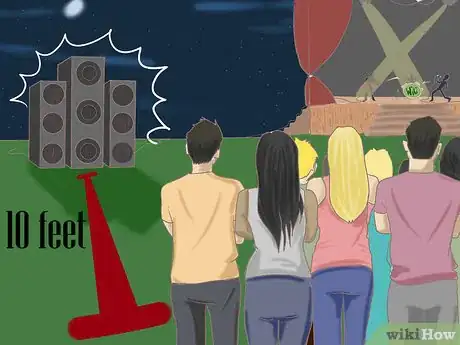

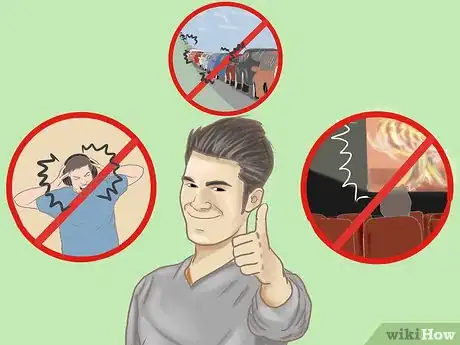


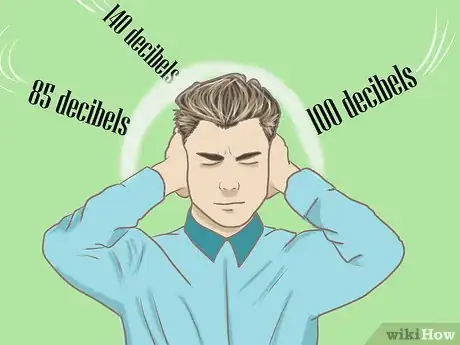





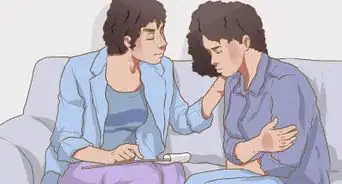





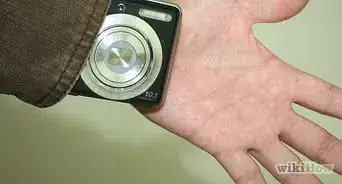
-Step-12.webp)

















































Medical Disclaimer
The content of this article is not intended to be a substitute for professional medical advice, examination, diagnosis, or treatment. You should always contact your doctor or other qualified healthcare professional before starting, changing, or stopping any kind of health treatment.
Read More...